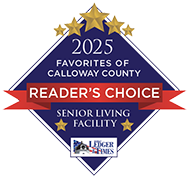Choosing to transition a loved one to an assisted living community is a significant decision, and it’s one that’s can be accompanied by many different emotions. This change represents a pivot toward a life filled with support, connection, and independence for seniors. For adult children and caregivers, it’s a relief to know that their loved one is being cared for by professionals in an environment specially designed for their needs.
What Is Assisted Living?
Assisted living is a senior living arrangement tailored for individuals who might need help with daily activities like bathing, dressing, or medication management but still wish to remain as independent as possible. It’s an ideal option for older adults who value their independence but may benefit from extra support to maintain a safe and healthy lifestyle.
Assisted living communities often have a vibrant, homey atmosphere. They offer residents access to personal care, social activities, recreational opportunities, and a range of services designed to enhance their quality of life.
If your loved one finds day-to-day tasks challenging or if you’re juggling caregiving responsibilities yourself, it might be time to consider whether assisted living can benefit everyone involved.
Benefits of Assisted Living for Seniors
Assisted living communities are more than just residences; they are active, thriving communities designed to meet the unique needs of their residents. Here are the advantages they provide specifically for seniors.
Increased Safety
Falls and accidents are common concerns for aging adults living alone. Assisted living communities are thoughtfully designed with built-in safety features such as grab bars, non-slip flooring, 24/7 staff availability, and emergency response systems. This ensures seniors can live confidently without fearing being alone during an emergency.
Socialization & Activities
Unfortunately, loneliness and social isolation are common among older adults, but assisted living fosters an engaging and connected lifestyle. Residents can enjoy social events like movie nights, book clubs, fitness classes, and cultural outings that build friendships and enrich their daily lives. Building meaningful relationships has been shown to improve mental and emotional health, and assisted living provides endless opportunities for connection.
Personalized Care
Every individual is different, and assisted living communities understand that. They provide care plans tailored to each resident’s needs, including assistance with daily tasks, medical management, or simply having someone to check in. This personalized approach ensures seniors feel valued and cared for while maintaining dignity.
Access to Services & Amenities
Assisted living centers cater to residents’ physical, emotional, and mental well-being, from freshly prepared meals to housekeeping, transportation, and wellness programs. These amenities enhance their quality of life and make daily living more enjoyable and stress-free.
Reducing Stress
For seniors accustomed to worrying about maintaining their homes, yard work, or grocery shopping, moving into an assisted living community offers the chance to focus purely on enjoying life. Without the burdens of home maintenance, seniors have more time to pursue hobbies, try new activities, and simply relax.
Benefits of Assisted Living for Adult Children

When seniors transition to assisted living, the improvements aren’t just felt by them. The shift also profoundly benefits the adult children who may have been shouldering the caregiving responsibility for their loved ones.
Reduced Caregiver Stress
Caring for an aging parent or grandparent is a labor of love. Still, it can also be physically and emotionally exhausting, especially when juggling full-time jobs or family commitments. Assisted living communities provide families with much-needed respite, knowing professionals support their loved ones.
Improved Relationships
Sometimes, caregiving can create tension or strain between family members. By transitioning parents or grandparents to assisted living, adult children can focus on enjoying quality time with their loved ones rather than managing daily caregiving duties. Conversations shift from managing medications to sharing family stories, playing games, or enjoying each other’s company.
Peace of Mind
One of the most significant advantages for families is the assurance that their loved one lives in a safe and supportive environment. With 24/7 staff on-site and tailored care plans, adult children can sleep easier knowing their parent or grandparent is being looked after with compassion and expertise.
Potential for Reduced Costs
In-home care may seem more affordable upfront, but can become costly when factoring in medical equipment, home modifications, and caregiver fees. Assisted living communities offer a more predictable financial plan by consolidating care and living costs into one package, often proving more cost-effective than incremental solutions.
More Time for Self
Balancing work, caregiving, and personal needs can seem impossible at times. Assisted living allows adult children to reclaim some of their time for self-care, work, or other personal priorities, ultimately benefiting their mental health and their ability to support their families.
How Assisted Living Supports Everyone in the Family
At its core, moving into assisted living fosters balance. Seniors receive the care, comfort, and independence they deserve, while families gain peace of mind and the ability to focus on their lives. This transition strengthens family bonds, ensuring the time spent together is meaningful.
Residents and their loved ones become part of a supportive, vibrant network that celebrates individuality and makes everyone feel like they belong.
At Hickory Woods Senior Living Community, we understand that life’s challenges can sometimes become overwhelming, making it difficult to manage day-to-day tasks independently. When additional support and care arise, it may be the perfect time to consider assisted living. Contact us today to book a tour to see our community for yourself.


